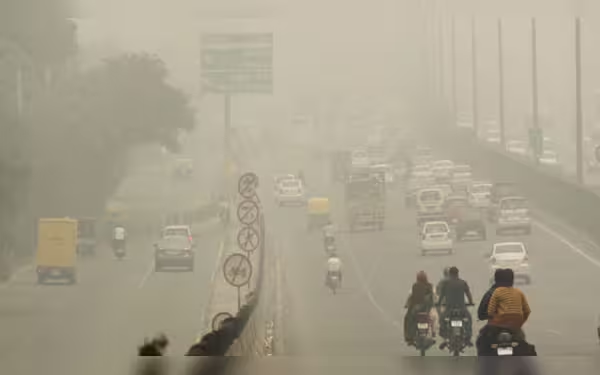Friday, November 8, 2024 05:42 AM
Faisalabad's Urgent Need for Mass Transit System
- Faisalabad faces severe smog and pollution issues.
- A new mass transit system is being planned.
- Metro bus service aims to improve urban transport.
 Image Credits: dailytimes_pk
Image Credits: dailytimes_pkFaisalabad is planning a mass transit system to combat severe smog and pollution, aiming to improve urban transport and residents' quality of life.
As winter approaches, the cities of Pakistan, particularly Faisalabad, are once again grappling with the severe issue of smog. This environmental crisis is primarily fueled by unrestrained population growth, a significant influx of people from rural areas to urban centers, and an ever-increasing number of vehicles on the roads. The result is a suffocating atmosphere that poses serious health risks to thousands of residents. Faisalabad, the third-largest city in the country, with a population exceeding four million, is particularly affected. The streets are filled with smoke-emitting vehicles, contributing to a stifling and polluted environment that creates numerous health and travel challenges.
The pollution in Faisalabad is exacerbated by various sources, including loaders, buses, cars, bikes, and rickshaws, many of which operate on substandard fuel. Additionally, brick kilns and industrial units release harmful smoke and waste, further deteriorating air quality. The lack of effective enforcement of environmental laws, poor urban planning, and the absence of a mass transit system are significant factors that worsen this dire situation.
Experts have proposed several solutions, including strict actions against polluting vehicles and industries. They also emphasize the urgent need for a comprehensive traffic and mass transit system to alleviate the chaos caused by QingQi rickshaws, which have become a nuisance in the city. The current road transport system in Faisalabad is often perceived as chaotic and unmanageable. However, historical precedents show that effective regulation is possible. For instance, in the early 1990s, Commissioner Tasneem Noorani initiated the Faisalabad Urban Transport System (FUTS), which was well-received and significantly improved urban transport.
Rana Munir Ahmed, a retired government official, noted that the legacy of urban transport regulation was continued by Deputy Commissioner Naseem Sadiq. He stressed the urgent need for a well-planned mass transit system to reduce the number of vehicles on the roads, control traffic congestion, and facilitate commuters. Such a system would not only ease traffic but also help in reducing vehicular emissions and pollution.
The existing urban transport system, launched in 1994, was designed to serve approximately 1.7 million residents on 20 routes. However, due to a lack of proper follow-up and the city's population growth to four million, this system has deteriorated, leading to increased congestion and pollution. The gap left by the insufficient urban transport has been filled by QingQi rickshaws, which have disrupted the traffic system and contributed to environmental degradation. Similarly, a government initiative to introduce large buses in 1999 gradually faded, pushing passengers back to private sector small wagons and rickshaws.
Recognizing the worsening situation, the Punjab government is now planning a new systematic mass transit system to tackle the traffic and pollution issues in Faisalabad, a city once dubbed the 'Manchester of Pakistan.' Chaudhary Muhammad Asif, Managing Director of the Faisalabad Development Authority (FDA), announced that the metro bus service would provide a mega, affordable, and comfortable intra-city transport option for residents. The project, funded by the Asian Development Bank (ADB) at an estimated cost of Rs.70 billion, aims to run metro buses on 35 routes in phases, catering to middle-class and low-income groups.
The initial phase will see eight routes identified for the metro buses, including key areas such as Gattwala Bridge to Bholay Di Jhuggi and Faisal Town to Rajbah Road. In subsequent phases, additional routes will be added, ultimately covering a 40-kilometer radius around the city with 370 standard buses. While private transporters express skepticism about mass transit systems, fearing loss of business, it is crucial for the government to devise a comprehensive transport system that includes public-private partnerships.
The introduction of a mass transit system in Faisalabad is not just a necessity but a vital step towards improving the quality of life for its residents. As the city continues to struggle with traffic congestion and pollution, the government must act swiftly to implement this project. If successful, it could serve as a model for other cities facing similar challenges, ultimately leading to a cleaner, more efficient urban environment for all.













